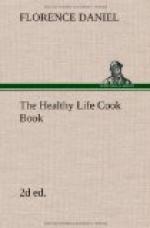The above recipe produces the ordinary white loaf. Better bread would, in my opinion, result from the use of a very fine wholemeal flour such as the “Nu-Era,” and the omission of salt.
XIV.—UNFIRED FOOD.
The true unfired feeder is an ideal, i.e., he exists only in idea, at least so far as my experience goes! To be truly consistent the unfired feeder should live entirely on raw foods—fruit, nuts and salads. But most unfired feeders utilise heat to a slight extent, although they do not actually cook the food. In addition, most of them use various breadstuffs and biscuits which, of course, are cooked food. “Unfired” bread is sold by some health food stores, and is a preparation of wheat which has been treated and softened by a gentle heat.
Cereals should never be eaten with fruit, but may be eaten with salads and cheese. The mid-day meal of the unfired feeder should consist of nuts or cheese and a large plate of well-chopped salad with some kind of dressing over it; olive oil and lemon-juice or one of the nut-oils and lemon-juice. Orange-juice or raw carrot-juice may be used if preferred. When extra nourishment is desired a well-beaten raw egg may be mixed with the dressing. Fresh cream may also be used as dressing.
Fruit is best taken at the evening meal, from 1-1/2 to 2 lbs. Nothing should be taken with it except a little nut-cream or fresh cream and white of egg.
Distilled water is a great asset to the unfired feeder, because it softens dried fruits so much better than hard water. It can be manufactured at home, or the “Still Salutaris” bought through a chemist or grocer. The “Still Salutaris” water is about 1/3 per gallon jar. If the water is distilled at home, a “Gem” Still will be needed. (The Gem Supplies Co., Ltd., 67, Southwark Street, London S.E.). It is best to use this over a gas ring or “Primus” oil stove. The cost of the water comes out at about one penny per gallon, according to the cost of the fuel used.
Distilled Water should never be put into metal saucepans or kettles, as it is a very powerful solvent. A small enamelled kettle or saucepan should be used for heating it, and it should be stored in glass or earthenware vessels only. It should not be kept for more than a month, and should always be kept carefully covered.
For salads it is not necessary to depend entirely upon the usual salad vegetables, such as lettuce, endive, watercress, mustard and cress. The very finely shredded hearts of raw Brussel sprouts are excellent, and even the heart of a Savoy cabbage. Then the finely chopped inside sticks of a tender head of celery are very good. Also young spinach leaves, dandelion leaves, sorrel and young nasturtium leaves. The root vegetables should also be added in their season, raw carrot, turnip, beet, onion and leek, all finely grated. A taste for all the above-mentioned vegetables, eaten raw, is not acquired all at once. It is best to begin by making the salad of the ingredients usually preferred and mixing in a small quantity of one or two of the new ingredients. For those who find salads very difficult to digest, it is best to begin with French or cabbage lettuce and skinned tomatoes only, or, as an alternative, a saucerful of watercress chopped very finely, as one chops parsley.




